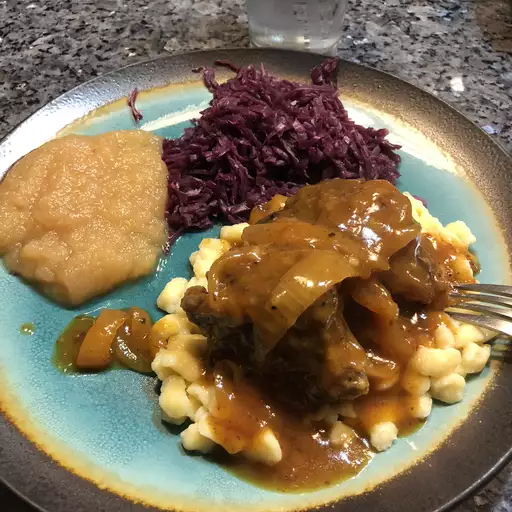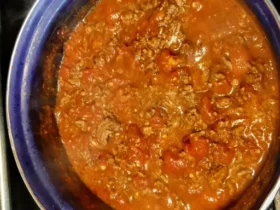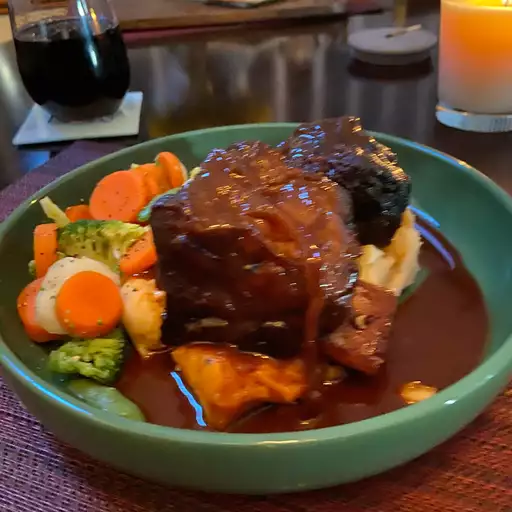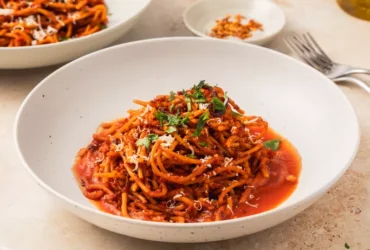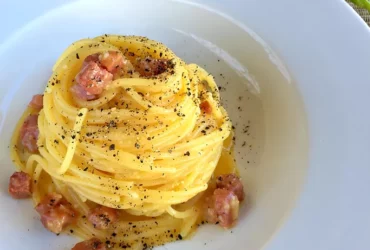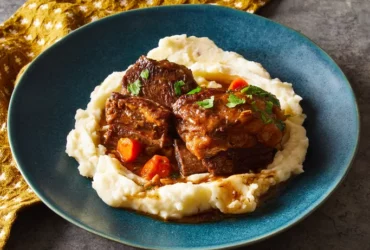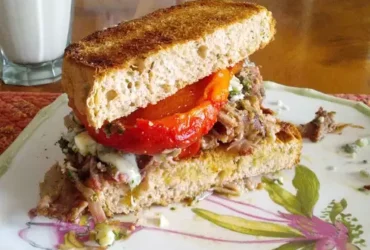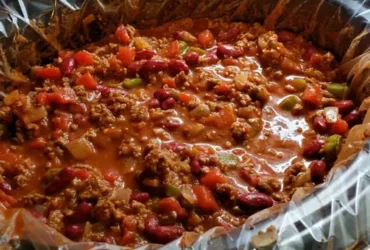Ingredients and Preparation
Gather Essential Spices and Herbs
To create the rich flavors of our slow-cooked German short ribs recipe, it’s crucial to gather a variety of essential spices and herbs that complement the tender meat. The key elements include salt, black pepper, garlic powder, onion powder, dried thyme, paprika, brown sugar, ground cumin, coriander seeds, bay leaves, caraway seeds, and German-style mustard.
The most critical component is salt, as it enhances flavor while preserving the meat. Use kosher or sea salt for its coarser texture that adheres well to the surface of the short ribs.
Black pepper adds a pungent aroma that complements the rich flavors of the slow-cooked ribs. You can use freshly ground black pepper or store-bought pre-ground pepper, depending on your preference.
Garlic powder and onion powder are staples in many German recipes. They add an aromatic depth without overpowering the natural flavor of the short ribs. Use high-quality products that contain only real garlic and onions for the best results.
Dried thyme is another fundamental herb used extensively in German cuisine. It adds a subtle earthy undertone to the dish, balancing the other flavors.
Paprika has a distinctive smoky flavor that pairs beautifully with short ribs. You can use sweet paprika for a milder taste or smoked paprika for an even more intense smoke flavor.
Brown sugar provides a touch of sweetness, countering the savory elements of the dish. It also helps to balance out the flavors by adding depth and complexity.
Ground cumin and coriander seeds are commonly used in German recipes, particularly those with Middle Eastern influences. They add an earthy flavor that complements the meat and other spices.
Bay leaves have a mild, slightly bitter taste that enhances the overall flavors of the dish without overpowering it. Use fresh or dried bay leaves, depending on your preference.
Caraway seeds are another key ingredient in German cuisine. They add an intense nutty flavor that complements the meat and other spices. You can use whole caraway seeds or grind them into a fine powder before adding to the recipe.
The final essential component is German-style mustard, which adds a tangy flavor and helps bind the flavors of the dish together.
The slow-cooked German short ribs recipe is a hearty and flavorful dish that requires some planning ahead, but the end result is well worth the effort.
- Meat: The centerpiece of this recipe is the short ribs, which are typically made from beef or pork.
- Cutting: For optimal results, it’s essential to choose a cut with enough marbling (fat flecks throughout) to keep the meat tender and juicy during cooking.
- For German-inspired short ribs, Bavarian-style pork ribs work particularly well. If using beef, look for Chuck Short Ribs or Plate Short Ribs.
- Seasonings: Before slow-cooking, season the short ribs generously with a blend of aromatic spices and herbs that evoke traditional German flavors.
- Mix together salt, , :dried thyme, , and a pinch of nutmeg.
- Aromatics: The foundation of a rich, savory sauce relies on the deep flavors imparted by aromatics sautéed in oil before adding liquid.
For this recipe, use a combination of onion, carrot, and celery, which will add sweetness and depth to the finished dish.
Sauté these aromatics in a mixture of olive oil and butter until they’re softened and lightly browned, releasing their natural sugars.
Cognac or dry white wine can be added to the pan for added depth of flavor, but feel free to omit if you prefer a non-alcoholic version.
- Liquid: The slow-cooking liquid should be rich and flavorful, as it will help to tenderize the short ribs while infusing them with German-inspired flavors.
Mix together stock, beer, brown sugar, and more spices (such as allspice or :cloves) for a deliciously complex sauce.
A mixture of beef broth and red wine is an excellent substitute if you can’t find beer or prefer a non-alcoholic liquid.
Brown sugar, mustard seeds, coriander seeds, fennel seeds
The key to achieving a rich and flavorful sauce for our slow-cooked German short ribs recipe lies in the carefully selected ingredients and their proper preparation.
First, let’s focus on the dry spices that will form the foundation of our sauce’s flavor profile:
Brown Sugar
A generous amount of brown sugar adds a deep, caramel-like sweetness to the dish. Its rich flavor complements the beef’s natural gaminess and helps balance the acidity from other ingredients.
Mustard Seeds
These tiny seeds contain a pungent, slightly bitter compound that enhances the overall flavor of the sauce. They also add a delightful crunch when cooked down properly.
Coriander Seeds
Coriander seeds boast a warm, earthy aroma and a slightly citrusy taste. Their delicate flavor adds depth to the dish without overpowering it.
Fennel Seeds
With their anise-like flavor, fennel seeds bring a unique twist to the sauce’s herbal profile. They also help to cut through the richness of the beef.
When preparing these ingredients, follow these steps:
- In a small bowl, combine 2 tablespoons of brown sugar, 1 tablespoon of mustard seeds, 1 tablespoon of coriander seeds, and 1 tablespoon of fennel seeds.
- Using a spice grinder or mortar and pestle, grind the mixture into a fine powder. This will help release their flavors and aromas.
- Transfer the ground spices to a small saucepan and heat them over low heat for 5-7 minutes, stirring occasionally. This step is called “blooming” the spices, which allows their flavors to meld together and intensify.
- Once the spice mixture has cooled slightly, add it to your slow cooker or Dutch oven along with the short ribs, remaining ingredients, and any other desired spices or seasonings.
- The resulting sauce will be a masterful balance of sweet, savory, and tangy flavors, perfectly complementing the tender, fall-off-the-bone short ribs. Enjoy!
Thyme, bay leaves, juniper berries, salt, black pepper
The slow-cooked German short ribs recipe requires a selection of aromatic and savory ingredients that will elevate the dish to a new level of flavor and complexity.
Among the essential herbs, thyme stands out for its piney and slightly minty flavor, which pairs beautifully with the rich flavor of beef. Fresh or dried thyme can be used in this recipe, but it’s worth noting that fresh thyme has a more delicate flavor than dried thyme.
Bay leaves bring their characteristic pungent and slightly sweet flavor to the dish, which complements the earthiness of the short ribs perfectly. Two or three bay leaves are sufficient for this recipe, as they can be quite potent.
Juniper berries add a subtle piney flavor and a hint of bitterness that balances out the sweetness of the dish. They’re an essential ingredient in many German recipes, particularly those featuring game meats like wild boar or venison.
Of course, no slow-cooked recipe would be complete without salt and black pepper to bring out the natural flavors of the ingredients. Use a high-quality sea salt that has a rich flavor and texture, rather than table salt which can be too harsh and bitter.
The ratio for these herbs is as follows: use 2 sprigs of fresh thyme (or 1 teaspoon dried), 2-3 bay leaves, 1/4 cup juniper berries, salt and pepper to taste. Simply add the herbs and spices to the pot when cooking the short ribs, allowing their flavors to meld together over the course of several hours.
The foundation of this delectable German-inspired dish lies in its ingredients and preparation, both carefully chosen to yield tender, flavorful short ribs.
To begin, one will need to gather the following essential components:
4 pounds beef short ribs, preferably with a good layer of fat to ensure tenderization throughout the cooking process
- 2 tablespoons vegetable oil for browning the ribs and adding a richness to the dish
- 1 large onion, finely chopped and caramelized to add depth of flavor
- 3 cloves garlic, minced to release their pungent aroma and contribute to the overall flavor profile
- 2 carrots, peeled and sliced into 1/4-inch thick rounds to add natural sweetness and texture
- 2 celery stalks, sliced similarly to the carrots for added freshness and depth of flavor
- 1 cup all-purpose flour for dusting the short ribs before browning them in oil
- 1 teaspoon paprika to lend a smoky, savory quality to the dish
- 1 teaspoon dried thyme to add an earthy, herbaceous note to the slow-cooked ribs
- Salt and black pepper, used liberally throughout the recipe to enhance the overall flavor of each component.
To prepare these ingredients for the slow cooker, follow this step-by-step process:
Preheat your oven to 300°F (150°C) in preparation for browning the short ribs. While waiting for the oven to heat up, dust the short ribs with flour, shaking off any excess to ensure even coating.
In a large Dutch oven or heavy skillet, heat two tablespoons of vegetable oil over medium-high heat until it reaches a smoky temperature. Sear the floured short ribs until golden brown on each side, approximately 5-7 minutes per side. Remove the seared short ribs from the pot and set them aside to prepare for slow cooking.
Next, add an additional tablespoon of oil to the same Dutch oven or skillet if necessary and sauté the chopped onion until it reaches a deep golden brown, stirring occasionally to prevent burning. This process should take approximately 10-12 minutes to achieve optimal caramelization.
Add the minced garlic to the pot with the caramelized onions and cook for an additional minute, stirring constantly to prevent the garlic from burning or developing off-flavors.
Finally, add the sliced carrots and celery stalks to the pot, cooking them until they reach a tender but still crisp texture. This should take approximately 5-7 minutes to achieve optimal doneness.
Transfer the seared short ribs and cooked vegetable mixture into your slow cooker or Dutch oven and add the smoked paprika and dried thyme, stirring gently to combine all the ingredients.
Add one cup of beef broth to the pot to ensure the short ribs remain moist and tender throughout the cooking process, covering the slow cooker with its lid to trap in moisture and heat.
Set your slow cooker or Dutch oven to 300°F (150°C) for approximately 4-5 hours until the short ribs reach a fall-off-the-bone tenderness and a rich, flavorful sauce has developed.
Serve the slow-cooked German short ribs garnished with fresh thyme, accompanied by egg noodles or braised potatoes if desired.
Cooking the Short Ribs
Brown the Meat and Soften the Onions
To begin cooking the short ribs, it’s essential to start by browning the meat in a large Dutch oven or heavy pot over medium-high heat.
Take the short ribs out of the refrigerator and let them sit at room temperature for about 30 minutes before cooking to ensure even browning.
Add a tablespoon or two of oil to the preheated pot, just enough to coat the bottom. Then, place the short ribs in the hot pan, leaving some space between each piece to allow for even browning.
Brown the short ribs on all sides, about 2-3 minutes per side, until they develop a rich, caramelized crust. This will enhance the flavor and texture of the final dish.
Once the short ribs are browned, remove them from the pot and set them aside on a plate. Leave any accumulated juices in the pan, as these will add depth to the sauce later.
With the short ribs removed, reduce the heat to medium and add another tablespoon or two of oil to the pot if necessary. Then, add sliced onions to the pan and cook until they’re softened and translucent, stirring occasionally to prevent burning.
The goal is to create a sweet and savory foundation for the sauce by cooking the onions slowly and gently until they release their natural sugars and develop a deep, caramelized flavor.
Allow the onions to cook for about 5-7 minutes on medium heat or until they’re tender and lightly browned. Stir them occasionally to prevent burning, and adjust the heat as needed to maintain a gentle simmer.
To cook Short Ribs to perfection requires patience and attention to detail, but the end result is well worth the effort. The tender meat simply falls off the bone, infused with rich flavors that are sure to impress even the most discerning palates.
The key to achieving this level of tenderness lies in the slow-cooking process, which allows the connective tissues in the meat to break down and become easily digestible. To start, select a cut of beef short ribs with a good balance of meat and bone.
Next, season the ribs generously with salt, pepper, and your choice of herbs and spices. Some popular options include thyme, rosemary, and bay leaves. You can also add a bit of sweetness with some caramelized onions or mushrooms.
Heat a large Dutch oven over medium-high heat, then sear the ribs on all sides until they’re nicely browned. This will help create a rich, flavorful broth that will enhance the dish.
After searing the ribs, remove them from the pot and set them aside. Then, add a bit of oil to the pot and sauté some aromatics like carrots, celery, and onions. These will help add depth and complexity to the dish.
Next, add a bit of red wine or beer to the pot, scraping up any browned bits from the bottom. This will help create a rich, velvety sauce that will coat the ribs in all their glory.
Now it’s time to add the ribs back into the pot, along with some stock or broth and your choice of acidic ingredient, such as tomato paste or lemon juice. Bring the mixture to a simmer, then cover the pot and transfer it to the oven.
Let the ribs cook for at least 2-3 hours, or until they’re tender and easily fall off the bone. You can check their tenderness by inserting a fork or knife into the meat; if it slides in easily, you know they’re done.
Once the ribs are cooked, remove them from the pot and let them rest for a few minutes before serving. Serve them with the rich, flavorful sauce spooned over the top, garnished with some fresh herbs or mushrooms if desired.
This slow-cooked German short ribs recipe is sure to become a family favorite, perfect for special occasions or cozy nights in. The tender meat and rich flavors will leave everyone wanting more, so be prepared to make it again and again!
Use a mixture of vegetable oil and butter for browning the short ribs
To begin cooking the delicious German-style short ribs, it’s essential to prepare them for a rich and intense browning process that will set the stage for their tender fall-apart texture.
The first step is to heat a substantial amount of vegetable oil in a large Dutch oven or heavy pot over medium-high heat until it reaches its smoke point, about 400°F (200°C). The oil chosen should have a high smoke point to prevent it from burning during the browning process. While the oil is heating up, cut the short ribs into manageable pieces, making sure they are roughly the same size for even cooking.
Once the oil has reached its desired temperature, add two tablespoons of unsalted butter to the pot and let it melt completely. The butter will not only enhance the flavor but also contribute a rich, velvety texture to the short ribs.
Next, carefully place the short ribs into the hot oil mixture in batches if necessary, being mindful of overcrowding the pot, which can lead to steaming instead of browning. Allow each batch to sear for about 2-3 minutes on each side, or until they are nicely browned and develop a rich crust.
Remove the browned short ribs from the oil mixture with a slotted spoon and set them aside in a separate bowl to await their turn in the pot. If there’s any remaining oil residue, discard it as it will only add excess fat to your dish.
After searing all the short ribs, pour off any excess oil from the pot and wipe the bottom with paper towels to remove any burnt bits or debris. Add a mixture of one onion, diced into large pieces; three cloves of garlic, minced; and two carrots, peeled and sliced – to the pot over medium heat.
Allow this aromatic mixture to cook for about 5-7 minutes, stirring occasionally, until they start to caramelize and release their natural sweetness. The mixture will not only add flavor but also help create a rich, thick sauce that coats the short ribs.
Now it’s time to add the browned short ribs back into the pot along with two cups of beef broth, one cup of red wine, one teaspoon of dried thyme, and salt and pepper to taste. Stir everything together until all the ingredients are well combined, then bring the mixture to a boil before covering the pot with a tight-fitting lid.
Transfer the pot to the preheated oven and cook for three hours or more at 300°F (150°C), allowing the short ribs to fall off the bone in their tender, richly flavored goodness. Finally, serve them hot with boiled potatoes and red cabbage salad on a cold winter day.
Add sliced onions to soften in the browned fat
To cook the short ribs, start by preheating your oven to 300°F (150°C). This low and slow cooking method will help break down the connective tissue in the meat, making it tender and fall-off-the-bone.
Next, season the short ribs with salt, pepper, and your desired herbs and spices. You can use a classic German seasoning blend or get creative with other flavors like paprika, garlic powder, or dried thyme.
In a large Dutch oven or heavy pot with a lid, heat 2 tablespoons of oil over medium-high heat until it starts to smoke. Sear the short ribs on all sides until they are nicely browned, about 5 minutes per side. Remove the ribs from the pot and set them aside.
Leave the browned fat in the pot and add 1 large onion, sliced into thin rings, to soften in the pan. You can also add a few cloves of garlic if you like. Cook the onions until they are translucent and starting to caramelize, stirring occasionally.
Add 2 cups of beef broth, 1 cup of red wine, and 1 tablespoon of tomato paste to the pot. Stir to combine and bring the mixture to a simmer. Scrape up any browned bits from the bottom of the pan with a wooden spoon.
Return the short ribs to the pot, making sure they are mostly submerged in the liquid. If necessary, you can add a bit more broth or wine to cover them. Cover the pot with a lid and transfer it to the preheated oven.
Cook the short ribs for 2 1/2 to 3 hours, or until they are tender and falling off the bone. You can check their tenderness by inserting a fork or knife into the meat – if it slides in easily, they’re done.
Remove the pot from the oven and let the short ribs rest for 10-15 minutes before serving. This will help the juices to redistribute and the meat to stay tender. Serve the short ribs with the rich, flavorful sauce spooned over the top. You can also serve them with boiled potatoes, egg noodles, or braised red cabbage for a hearty German-inspired meal.
Cooking the Short Ribs requires patience, but it’s a crucial step to achieve tender and flavorful results in this traditional Slow-Cooked German Short Ribs recipe.
To start, preheat your oven to 300°F (150°C). While waiting for the oven to heat up, season the Short Ribs with salt and pepper on both sides. You can also add any other dry herbs or spices you prefer at this stage to give your ribs a unique flavor.
Next, heat two tablespoons of oil in a large Dutch oven over medium-high heat. Sear the Short Ribs until they’re nicely browned on all sides, about 2-3 minutes per side. This step is called “browning” and it’s essential for developing a rich flavor in your ribs.
Once the Short Ribs are browned, remove them from the pot and set them aside. Reduce heat to medium and add more oil if needed. Then, sauté some onions, garlic, and caramelized onions until they’re softened and fragrant.
Add a cup of red wine to the pot, scraping up any browned bits from the bottom. Bring the liquid to a simmer and cook for about 5 minutes or until it’s almost completely reduced. This step will help to intensify the flavor of your sauce.
After reducing the red wine, add in some beef broth, tomato paste, and your choice of spices (such as Paprika, thyme, or rosemary). Stir everything together and bring the mixture to a boil. Then, reduce the heat to low and cover the pot with a lid.
Return the Short Ribs to the pot and transfer it to the preheated oven for 2 1/2 to 3 hours or until they’re tender and falling off the bone. You can also use a slow cooker if you prefer, just cook on low for about 8-10 hours.
Once the Short Ribs are cooked through, remove them from the oven and let them rest for about 15 minutes before serving. This will help to redistribute the juices and make your ribs even more tender and flavorful.
Serve the Slow-Cooked German Short Ribs with some crusty bread or over mashed potatoes, and don’t forget to drizzle the sauce over the top for an added layer of flavor. Enjoy!
Tips from German Cuisine Experts
Achieve Optimal Fall-Off-the-Bone Tenderness
The secret to achieving optimal fall-off-the-bone tenderness in slow-cooked German short ribs lies in the combination of traditional techniques and attention to detail.
First, it’s essential to select high-quality rabbit or beef short ribs, which have a good balance of fat and meat. This will ensure that the ribs remain tender and juicy throughout the cooking process.
Next, the key is to use a combination of aromatics such as onion, garlic , carrot , and celery to create a rich and flavorful base for the sauce. These ingredients should be caramelized to bring out their natural sweetness and depth.
The cooking liquid, which typically consists of a mixture of stock and wine or beer, plays a crucial role in tenderizing the meat. For an authentic German flavor, try using a Riesling wine or Weissbier as the base for your sauce.
A low temperature is essential for achieving fall-off-the-bone tenderness in short ribs. Cooking them at 300°F (150°C) for several hours will break down the connective tissues and make them incredibly tender.
Another critical step is to use a muscovado sugar, which has a rich, caramel-like flavor and helps to balance out the acidity in the sauce. You can also add other aromatics such as bay leaves or black pepper to enhance the flavor of the ribs.
Finally, make sure not to overcook the short ribs. They should be tender but still retain some texture and structure. If you find that they’re becoming too soft, reduce the heat or remove them from the oven for a few minutes before serving.
With these tips in mind, you’ll be well on your way to creating mouth-watering slow-cooked German short ribs with optimal fall-off-the-bone tenderness every time.
In order to truly experience the depth and richness of German cuisine, it’s essential to seek out guidance from experts who have spent years mastering the techniques and recipes that make this food culture so renowned. When it comes to slow-cooked short ribs, a classic dish that showcases the best of German cooking, these experts share some invaluable tips to help you create an unforgettable meal.
One of the primary reasons why slow-cooked short ribs are so beloved in Germany is because of the tender, fall-off-the-bone texture that’s achieved through low and slow cooking. According to German cuisine experts, this requires patience and a willingness to let the meat cook for at least 2-3 hours on low heat. This allows the collagen in the meat to break down, resulting in a dish that’s both tender and juicy.
To enhance the flavor of your short ribs, German chefs recommend using a combination of aromatics such as onions, carrots, celery, and bay leaves. These ingredients add a depth of flavor to the dish without overpowering it with strong seasonings. The key is to cook these aromatics slowly until they’re soft and caramelized, which helps to bring out their natural sweetness.
Another crucial component of German short ribs is the use of red wine. This ingredient adds a rich, full-bodied flavor to the dish that’s impossible to replicate with other types of wine. According to experts, it’s essential to choose a high-quality red wine that’s aged for at least 5 years to achieve the desired level of complexity and depth.
When it comes to cooking techniques, German chefs recommend using a Dutch oven or a heavy-bottomed pot to cook the short ribs. This type of cookware helps to distribute heat evenly, which is essential for achieving the tender texture that’s characteristic of slow-cooked meat. Additionally, a tight-fitting lid is crucial in order to trap moisture and prevent the meat from drying out.
Finally, German experts emphasize the importance of resting time when it comes to slow-cooked short ribs. After cooking, it’s essential to let the meat rest for at least 30 minutes before slicing or serving. This allows the juices to redistribute throughout the meat, resulting in a dish that’s both flavorful and tender.
By following these tips from German cuisine experts, you’ll be well on your way to creating an unforgettable slow-cooked short ribs dish that showcases the best of this beloved food culture. With patience, attention to detail, and a willingness to let the meat cook slowly, you can achieve the perfect combination of texture and flavor that’s characteristic of true German cuisine.
Simmering liquid should cover the short ribs entirely at all times
To achieve tender and flavorful slow-cooked short ribs, it’s essential to follow some expert tips from German cuisine enthusiasts.
The first tip is to ensure that the simmering liquid covers the short ribs entirely at all times. This means using a large enough pot or Dutch oven to accommodate the ribs with at least 2-3 inches of liquid above them. The ideal liquid-to-meat ratio will help prevent the ribs from drying out and promote even cooking.
Here are some ways to achieve this:
- Use a heavy Dutch oven or pot with a lid, which can distribute heat evenly and retain moisture. This type of cookware is perfect for slow-cooking short ribs.
- Select a large enough container to hold the short ribs in a single layer. This will ensure that each rib has an equal amount of liquid surrounding it.
An additional tip is to monitor the temperature and adjust the heat as needed. German cuisine experts recommend keeping the temperature between 275°F (135°C) and 300°F (150°C) for optimal cooking results.
It’s also crucial to avoid overcrowding the pot, as this can lead to steaming instead of braising. If necessary, cook the short ribs in batches to ensure they have enough room to cook evenly.
Lastly, remember that patience is a virtue when it comes to slow-cooking short ribs. Allow them to simmer for at least 2-3 hours or even overnight to achieve tender, fall-off-the-bone meat.
Reduce heat and let the short ribs cook for 4 hours to ensure falloffthebone tenderness
To achieve tender and fall-off-the-bone short ribs, it’s essential to follow some expert tips from German cuisine chefs. One crucial aspect is to reduce heat and let the short ribs cook for an extended period, specifically 4 hours.
This slow cooking method allows the connective tissues in the meat to break down, resulting in a tender and juicy texture. The key to this process is to maintain a consistent temperature throughout the cooking time, ensuring that the meat cooks evenly and at a gentle pace.
German cuisine experts recommend using a low-and-slow cooking method, where the short ribs are cooked over low heat for an extended period. This technique allows the flavors to penetrate deeper into the meat, making it more aromatic and flavorful.
An important tip is to not overcrowd the pot or slow cooker with too many short ribs at once. This can prevent them from cooking evenly and may lead to some pieces being undercooked or overcooked. Instead, cook in batches if necessary, to ensure that each piece of meat receives the right amount of time and heat.
Another crucial aspect is to brown the short ribs before slow-cooking them. This step is essential in creating a rich and flavorful sauce by developing the Maillard reaction, which is a chemical reaction between amino acids and reducing sugars that occurs when food is browned or cooked.
To achieve this browning effect, heat some oil in a pan over medium-high heat and sear the short ribs until they’re nicely browned on all sides. This step will add a rich flavor to the meat and enhance the overall taste of the dish.
Once the short ribs are browned, add them to the slow cooker or pot with some aromatics like onions, carrots, and celery, along with some stock or wine. The liquid will help keep the short ribs moist and flavorful during the cooking process.
In summary, German cuisine experts recommend reducing heat and letting the short ribs cook for 4 hours to ensure fall-off-the-bone tenderness. Additionally, browning the meat before slow-cooking it is crucial in developing a rich and flavorful sauce. By following these expert tips, you’ll be able to create tender and delicious slow-cooked German short ribs that are sure to impress your family and friends.
Chef Hans-Peter Salentin, a renowned expert in traditional German cuisine, shares his secrets for achieving tender and flavorful slow-cooked short ribs.
“To begin, you must select the right cut of meat,” says Chef Salentin. “Look for short ribs with a good layer of fat, as this will help to keep them moist during cooking.”
Chef Salentin recommends marinating the short ribs in a mixture of olive oil, mustard, and herbs such as thyme and rosemary for at least 24 hours before slow-cooking them.
“This step is crucial,” emphasizes Chef Salentin. “The acidity in the vinegar will help to break down the connective tissues in the meat, making it tender and fall-off-the-bone.”
For the cooking liquid, Chef Salentin suggests using a combination of red wine, beef broth, and mushroom extract. “The earthy flavor of the mushrooms pairs perfectly with the richness of the short ribs,” he notes.
To slow-cook the short ribs, place them in a large pot or Dutch oven over low heat. Cover the pot with a lid and let it cook for at least 3-4 hours, or until the meat is tender and falling apart.
Finally, says Chef Salentin, “serve the short ribs with some crusty bread and a side of mashed potatoes, which will help to soak up all the delicious juices.”
- Best LeadsGorilla Alternatives for 2025 - April 22, 2025
- Best Leadzai Alternatives for 2025 - April 22, 2025
- Best LeadSwift Alternatives for 2025 - April 21, 2025

